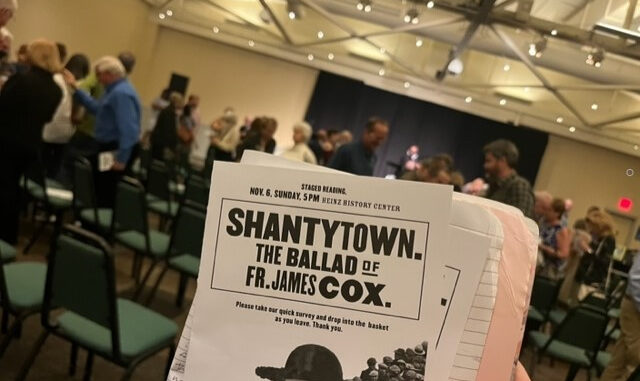
Capri Scarcelli | A&E Editor
Nov. 10, 2022
Sitting with a pile of newspaper clippings during the pandemic, Pittsburgh playwright Ray Werner pieced together the forgotten story of Friar James Cox: 1930s St. Patrick’s Church pastor and activist that housed many and fed millions, single-handedly leading the Strip District out of poverty during the Great Depression. Putting a mark on his house ultimately put a mark on the heart of Pittsburgh, defining the city’s love for giving back and paying it forward.
Pairing with director Gregory Lehane and artistic musical director Dwayne Fulton, these artists honored Cox’s life in story and song through the upcoming Pittsburgh Playwrights 2023 musical, “SHANTYTOWN: The Ballad of Fr. James Cox.”
“We wanted to make sure we could move the theatrical world forward, building a framework that would educate the community and tell a story,” Lehane said. “You can take everything away from a person, but you can’t take their song, and that is what we wanted to show people, a time where people had their illegal cocktails and told each other real stories about real struggle.”
Showcasing eight cast members and a pianist, the show persisted through snarky dialogue and heartfelt ballads, scripts on the music stands with booming voices that carried through the hall with exuberance. The energy of the cast encapsulated the hopeful cheer of living through the trying times of the Depression, and kept audiences fully engaged without a prop in sight.
Featured in the cast is John Alex Noble, adjunct School of Music professor at Duquesne. Invited to the cast by producer Monteze Freeland, Noble accepted the role of Big John for this reading – one of the homeless folk from the Strip District who befriended Cox in the ’30s.
According to Noble, “The purpose of readings is to gauge an audience reaction and interest as well as to hear the words read aloud by actors to see if it translates from page to page.” This helps writers get a live reaction of what audiences like and what might need to be fine-tuned.
The story is told through Stephen, a journalist who is profiling Cox’s life behind-the-scenes of his do-good model. Slowly, he realizes there is no facade – Cox is truly a miracle worker.
The show holds its humor, as well as its heartfelt moments, at a high standard, poking fun at President Herbert Hoover’s mistakes while also expressing the grief of raising a child in trying times. The show is conversational throughout, integrating dialogue in the songs to show the effects of poverty through different perspectives. The American Dream could not be more clearly visualized, hoped for and celebrated.
Dominique Briggs as “Catherine” and Charlese Dawson as “Emma” brought powerhouse vocals to the show. With ballads in the rising action and climax, these characters shined in a way that showed how special and individually deserving each person was that Cox helped.
Throughout the show, Cox led 20,000 jobless individuals in a labor law demonstration in Washington, printed the first food stamps and even ran for president before passing the torch to Franklin D. Roosevelt.
In between these ambitious successes to advocate for those in need, Cox allowed those without a home to stay in St. Patrick’s basement, either paying them for “odd jobs” or running underground lotteries to help give back to the community. An investigation was called, and Cox was sent to court, which is the show’s falling action and more somber tone in the music.
At the end of the musical, when Cox dies, the song “Hope” is reprised with the full cast in an uplifting, delicate air that sweeps the audience to standing ovations and applause. Stephen’s article is finally written, and it is now a eulogy instead of a profile.
At the end of the read-through performance, a Q&A reflection session was held for audience members to ask questions and express their favorite moments throughout the show.
“This show is very Pittsburgh. An Irish Catholic priest standing up for the poor during one of the most difficult times in our nation’s history. He changed things at the local and national level and stood up to powerful people to make this world a better place,” Noble said.
Charles McCollester, an avid theater-goer and Pittsburgh Playwright audience member, said that in all of his 20 years of seeing plays and musicals in the area, this show will be “one of the most beautiful.”
“It is so moving to see Irish Catholic social justice voices in theater. Father Cox was an inspiration, and it is incredible to see the wonderful Black Pittsburgh playwrights honor one of Pittsburgh’s greatest treasures,” McCollester said. “Keep ‘Shantytown’ amongst your friends, you will see it again.”

